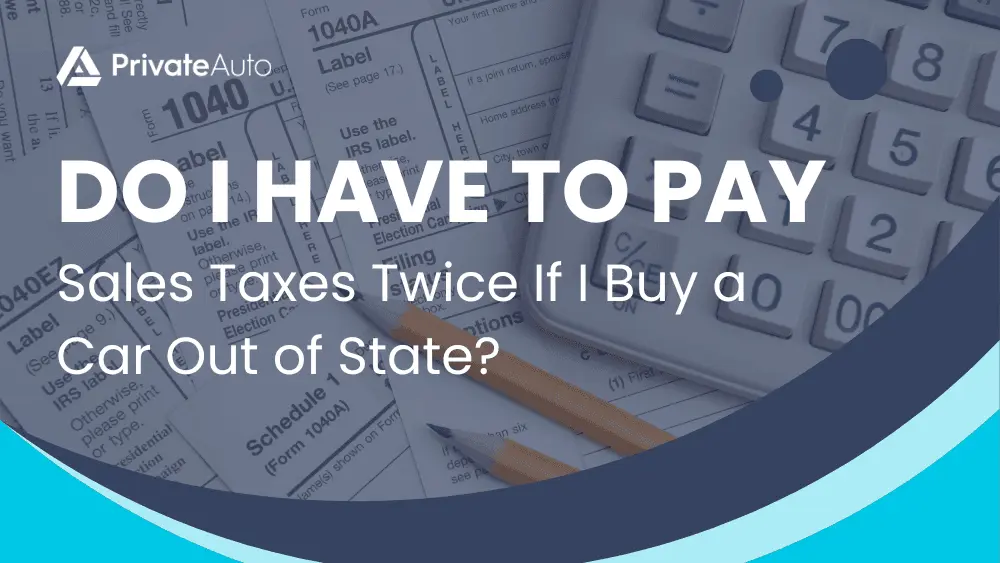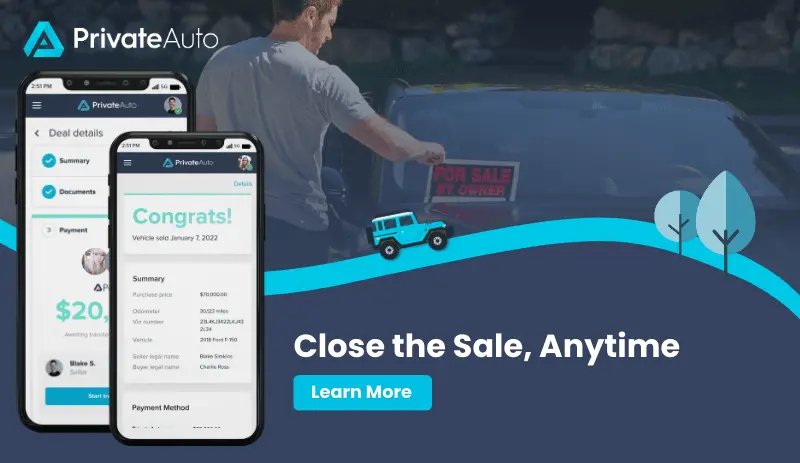In addition to state sales tax, you’ll probably also owe additional taxes and fees related to registration, license plates, title transfer, and city or county taxes.
Where do I pay sales tax?
If I Buy A Car In Another State, Where Do I Pay Sales Tax?
For example, if you live in Delaware with a 0% sales tax rate and purchase a car in Maryland with a 6% sales tax rate, you will not pay any sales tax to Maryland.
Unless you need to get a temporary registration in the state of purchase. That complicates things.
Titling and registering an out-of-state car
What if I Need Temporary License Plates and Registration?
1. In the seller’s state, you’ll pay that state’s sales tax rate on the vehicle purchase price to get the temporary registration and plates.
2. If the seller’s state has a lower tax rate than your home state, you pay the difference when you register the car back home.
3. If your state has a lower tax rate (or doesn’t have sales tax), you will not get your money back.
Either way, you won’t be double-taxed—but you could end up paying more tax than if you didn’t get the temp registration.
The most obvious solution: don’t drive the car back. With PrivateAuto, you can easily buy a car remotely and have it shipped. No temporary registration needed.
Looking to buy an out-of-state car? Get a fast car transport quote here.
Reporting an out-of-state vehicle purchase
How is Used Car Sales Tax Calculated in New Mexico ?
For those who might be inclined to declare a low purchase price to lower their tax liability, bad news. If the state finds that “the declared purchase price of the vehicle is lower than 80% of the N.A.D.A. average trade-in or wholesale value,” they will calculate sales tax based on the NADA value.
It is important to note that underreporting the purchase price of a vehicle in order to avoid paying sales tax is illegal.
Penalties for not reporting out-of-state purchases
Are there Penalties for Not Reporting Out-of-State Purchases?
- Fines from $500 to over $1,000 depending on the state
- Suspension or revocation of driver’s license
- Possible criminal charges for tax evasion
- Seizure or impoundment of the illegally registered vehicle
Save yourself the trouble. Do it right from the start by fully reporting your out-of-state purchase when registering the vehicle. Paying applicable taxes is a small burden compared to large fines and legal issues.
Strategies to minimize fees on out-of-state purchase
What are the Strategies to Minimize Fees on Out-of-State Purchase?
1. Buy from a private seller rather than a dealer
2. Hire an inspector as your remote purchasing agent
3. Have your car shipped to you
Buy From a Private Seller Rather Than a Dealer
- Avoid extra fees. Dealerships charge documentation fees that range from $50 to over $1,000.
- Get a better price. Avoid the middleman markup.
- You have access to a wider pool of potential sellers if you buy privately. More cars to choose from, at better prices.
- You drive the deal on your terms: PrivateAuto allows you to make offers and negotiate the best deal directly with the seller.
- In some states, buying from a private seller means no sales tax. For example, Hawaii and Nevada charge sales tax on retail (dealership) car purchases, but not on private-party ones.
We do admit that dealers bring a certain amount of convenience that you don’t traditionally get when you buy from a private seller. That’s why we exist. PrivateAuto gives you dealer-like convenience in the palm of your hand while allowing you to transact peer-to-peer with regular folks like yourself.
Hire an Inspector as Your Remote Purchasing Agent
After you’ve located the right car and negotiated a price, you arrange for a trusted inspector in the area to thoroughly evaluate the vehicle on your behalf. Not only will they check under the hood and test drive the car, but they will also handle any paperwork and make sure the car gets shipped off to you.
With real-time progress updates, you’ll have confidence knowing your inspector-agent is verifying the car’s condition before you release funds.
Order Car Transport
Our RunBuggy partnership gives you fast and affordable car shipping options within the PrivateAuto ecosystem.
Questions to ask the seller when buying a car long distance
What Should I Ask a Seller When Buying a Car Long Distance?
Here are some basic questions you can ask if you feel inclined:
- Why are you selling this car?
- How long have you owned it?
- Tell me about its maintenance history.
- Who was the main driver of the vehicle, and what were their driving habits?
- What sorts of driving conditions was the car mostly driven in?
- When not being driven, where was the car parked?
- Is the car under warranty? (Most used cars are not under warranty, but if this one is, that’s great news.)
- Have any major modifications or repairs been made to it?
- Do you have copies of your service records?
- Does the car have a clean title? (If it has a branded or salvage title, you definitely want to know this before arranging an inspection.)
All of these questions—and any other communication—happen within our in-app messaging feature, so you’ll never need to give out your contact info to a stranger.
What are the Pros and Cons of Buying a Car Out-of-State?
Pros of an out-of-state car purchase:
1. Expanded selection.
2. Potential to find better a better deal.
Cons of an out-of-state car purchase:
1. Can’t personally inspect the car before purchasing.
2. Hassle getting the car home.
We help you resolve the “cons” so you can enjoy the benefits of the “pros.”
How to Buy a Car Remotely with PrivateAuto?
1. Shop used vehicles for sale, make offers, and settle on the vehicle you want to buy.
2. Transfer funds from your regular bank account (checking or savings) to your PrivateAuto Pay account. If you need to apply for financing, you can do so right in the PrivateAuto app for competitive rates from our FDIC-approved lending partner. The lender will fund your PrivateAuto Pay account for you.
3. Get a car history report (included in the seller’s PrivateAuto listing if they’ve opted for Premium).
4. Arrange for a local inspector to act as your agent and schedule a meeting between the inspector and seller.
5. Arrange car shipping from the seller’s location to yours.
6. The inspector will perform a pre-purchase inspection and test drive the car on your behalf.
7. After the vehicle inspection turns up no issues, you and the seller each sign the bill of sale in the PrivateAuto app. You’ll get immediate confirmation that the seller has signed and that you are now safe to pay for the car since your counterparty is legally obligated to follow through.
8. Transfer funds to the seller instantaneously via PrivateAuto Pay (works any time of day, any day of the week). The seller will get immediate confirmation of funds received into their PrivateAuto Pay account.
9. The seller signs the vehicle title over to you and hands it over to the inspector, who will send it to you certified mail for you to sign.
10. The inspector ensures the car is loaded onto transport and shipped off to you.
11. You call your insurance company and get an auto insurance policy for the vehicle.
12. You receive your car and finish the title transfer at your state’s DMV or equivalent organization. At the same time, you’ll register it in your name, get new license plates, and pay sales tax (if applicable).
13. Enjoy your new-to-you car!
If you’ve already found the car you want to buy, our DealNow fast-track solution allows you to start a deal elsewhere (on another platform such as Autotrader, or with someone you met in real life) and finish it with PrivateAuto’s transactional solution.
How to Transfer the Title and Register an Out-of-State Car?
The previous owner will have signed the title over to you when you purchased the car. Now you need to finalize the title transfer with your state. At the same time you do so, you will register the car in your name.
Here are some of the most commonly required documents that a state’s DMV will require:
- A completed vehicle title transfer and registration application form
- Proof of auto insurance
- Proof of identity (driver’s license or government-issued ID card)
- Bill of sale—done through the PrivateAuto mobile app with e-signatures
- The original title (or a duplicate title, if the original one had gotten lost)
- An odometer disclosure statement—required by some states
- A highway safety inspection—required by some states
- Payment for your state’s car sales tax, if applicable
Paperwork requirements will vary from state to state, but you should expect to bring the following documents:
1. Valid driver’s license
2. Proof of auto insurance
3. A bill of sale
4. Completed certificate of title
5. Emissions test certificates
6. A completed registration form
In most states, you will have 30 days to register the car.
While you are registering your vehicle, you will also apply for new license plates.
Looking to sell your car? Create a listing on PrivateAuto and connect with interested buyers today!
Buying a Car Out of State FAQ
What are the best transport services?
PrivateAuto has teamed up with RunBuggy to integrate car shipping services into our transactional marketplace. This partnership enables you to seamlessly arrange vehicle transport from within your PrivateAuto dealroom.
Once you’ve found your dream car and agreed to buy it, simply request a shipping quote. We’ll connect you to RunBuggy’s vast carrier network to ship vehicles anywhere in the continental US. Their team handles logistics while you track progress in your PrivateAuto dashboards.
RunBuggy offers open or enclosed shipping tailored to any car and budget. Rely on their licensed, insured drivers and door-to-door services to simplify your PrivateAuto experience. No need to coordinate transport separately—we wrap it into the transaction process.
Streamline your entire used car purchase journey with PrivateAuto’s integrated shipping. We bring services together in one place so you can buy, sell, and transport vehicles with total ease.
Which states are tax-free states?
Alaska, Delaware, Montana, New Hampshire, and Oregon, have a tax rate of zero. Nevada and Hawaii don’t levy taxes on private-party car sales, though they do on dealership purchases.
What to do after you buy a car from a private seller?
Buying motor vehicles from private sellers rather than car dealerships requires a few extra steps to make sure you can legally drive and register the car.
Key steps after buying the car privately are registering the vehicle, transferring the title, and getting new license plates issued in your name (unless you’re in California or Minnesota).
While specifics can vary from state to state, here are the basics of what you need to do after buying a car from a private seller.
– When you purchase the car, the seller should provide you with the Certificate of Title. Review it to make sure their name is listed and they signed it over to you.
– Contact your insurance company to add the car to your policy. You typically need valid insurance in your name to drive legally. Make sure you have proof of insurance.
– Head to your local DMV as soon as possible to transfer the title to your name and register the car. Bring the title, bill of sale, ID, and insurance documents. Pay any required sales taxes and registration fees.
– The DMV will provide you with new registration documents and license plates for the car in your name. These are required to legally drive the car.
– All states except California and Minnesota: the seller will remove the old license plates, and you will get new plates from the DMV and install them.
– Get any required safety and emissions testing.
– Notify your insurance company that the car is now registered in your name. Provide them with the new VIN, plates, and registration.
How to avoid fraud when buying a car?
Unfortunately, criminals use a variety of methods to trick car buyers, such as faked vehicle histories, odometer tampering, or title scams.
PrivateAuto offers vehicle history reports with all premium listings and also has identity verification. These measures cut down significantly on fraudsters, but it always pays to be vigilant.
Don’t let a seller rush you into accepting a high price or paying without verifying the details and test driving. If a seller gives you a high-pressure “act now or lose out” ultimatum, it’s best to walk away. If the car is priced fairly, there will be other listings available without undue seller pressure.
The key is taking your time—carefully inspecting the car, verifying the VIN, test driving carefully, and not paying until you’re confident about going through with the transaction.
PrivateAuto helps by letting you schedule test drives securely and make payments only when terms are met. With a little patience, you can find the right car without being rushed into a fraudulent deal.
Additional Reading
How do I replace a lost car title?
What is the best way to pay for a car?
Is it safe to buy a car with cash?
Are bank transfers good for private-party car purchases?
Do I pay sales tax even if I buy a car from a private seller?
Calculate your vehicle sales tax today!
Where is the best place to buy a car online?
What to do after buying a faulty car?

Landon Epperly
Contributing Author
Jacob Andra is an entrepreneur, author, and technology expert living in Salt Lake City, Utah. As a stakeholder in PrivateAuto, Jacob is passionate about how our technology is bringing peer-to-peer car sales into the 21st century. When he’s not working, Jacob can be found playing pickleball, climbing mountains, or spending time with his family.




